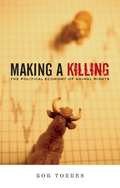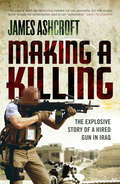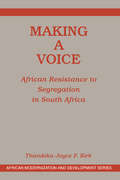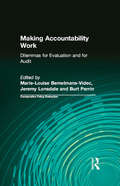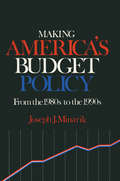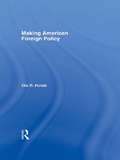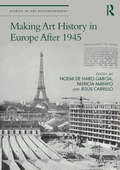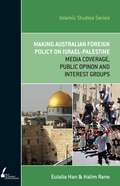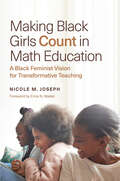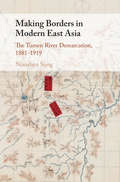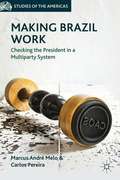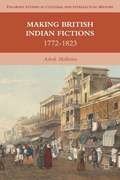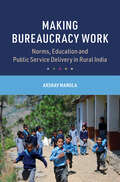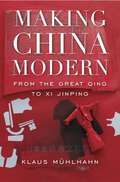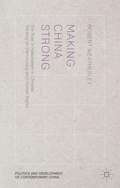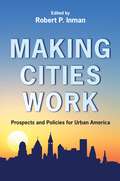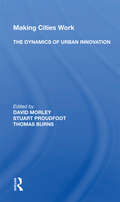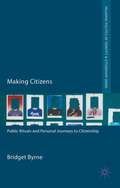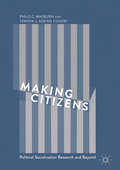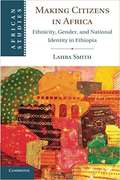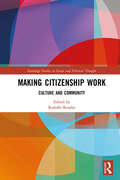- Table View
- List View
Making A Killing
by Bob TorresSuggest to the average leftist that animals should be part of broader liberation struggles and--once they stop laughing--you'll find yourself casually dismissed. With a focus on labor, property, and the life of commodities, Making a Killing contains key insights into the broad nature of domination, power, and hierarchy. It explores the intersections between human and animal oppressions in relation to the exploitative dynamics of capitalism. Combining nuts-and-bolts Marxist political economy, a pluralistic anarchist critique, as well as a searing assessment of the animal rights movement, Bob Torres challenges conventional anti-capitalist thinking and convincingly advocates for the abolition of animals in industry--and on the dinner plate.Making A Killing is sure to spark wide debate in the animal rights and anarchist movements for years to come.Table Of Contents:I Taking Equality SeriouslyII Chained CommoditiesIII Property, Violence, and the Roots of OppressionIV Animal Rights and WrongsV You Cannot Buy the RevolutionAdvance praise for Making A Killing"Bob Torres' Making a Killing draws a very straight line between capitalism and the oppressive system of animal agribusiness. Drawing from social anarchist theory, Torres provides a convincing argument that in order to fight animal exploitation, we must also fight capitalism and, in doing so, animal rights activists will need to reconsider their methods and redirect their focus. While his critiques of the animal rights movements' large organizations may not earn him friends in high places, such considerations are crucial to keeping the movement on track and for preventing stagnation.Making a Killing is an important work from a new voice in animal advocacy that will surely spark heated discussions amongst activists from all corners of the movement."--Ryan MacMichael, vegblog.org"In Making A Killing: The Political Economy of Animal Rights, Bob Torres takes an important and timely look at the animal rights movement, calling for a synthetic approach to all oppression, human and animal. His analytical framework draws together Marxism, social anarchist theory, and an abolitionist approach to animal rights to provide a timely social analysis that will no doubt have profound effects on the animal rights movement literature."--Gary L. FrancioneDistinguished Professor of Law, Rutgers University"Bob Torres's socioeconomic analysis of nonhuman animal use is a welcome and important addition to the understanding of human-nonhuman relations at the beginning of the 21st century. In particular, Making a Killing, makes vital a contribution to understanding the role of the property status of animals and the continuing strength of various welfarist positions on the ethics--and indeed the economics--of the human utilisation of other animals. Making a Killing will become required reading for social scientists and others interested in modern social movements and the socioeconomic forces that shape their activities and their claims-making."--Dr. Roger Yates, Lecturer in sociology at University College, Dublin, Republic of Ireland"This is the book I've been waiting for. Making A Killing is a rare and powerful example of first-rate scholarship, a searing critique, and lively declaration of the rights of animals and humans. You will walk away from this book with a clear understanding as to why social justice movements for people must take animal rights seriously, and vice versa. Bob Torres has forever deepened my thinking about these relationships."--David Naguib Pellow, vegetarian, animal rights and anti-racist activist, and Professor of Ethnic Studies, University of California, San Diego; and author of Garbage Wars: The Struggle for Environmental Justice in Chicago and Resisting Global Toxics: Transnational Movements for Environmental JusticeBob Torres is assistant professor of sociology at St. Lawrence University, received his PhD from Cornell, and is co-author of Vegan Freak: Being Vegan in a Non-Vegan World. His writings have appeared in Critical Sociology, The Journal of Latinos and Education...
Making A Killing: The Explosive Story of a Hired Gun in Iraq
by James AshcroftIn September 2003, James 'Ash' Ashcroft, a former British Infantry Captain, arrived in Iraq as a 'gun for hire'. It was the beginning of an 18-month journey into blood and chaos.In this action-packed page-turner, Ashcroft reveals the dangers of his adrenalin-fuelled life as a security contractor in Baghdad, where private soldiers outnumber non-US Coalition forces in a war that is slowly being privatised. From blow-by-blow accounts of days under mortar bombardment to revelations about life operating deep within the Iraqi community, Ashcroft shares the real, unsanitised story of the war in Iraq - and its aftermath - direct from the front line.
Making A Voice: African Resistance To Segregation In South Africa (African Modernization And Development Ser.)
by Joyce F KirkSince apartheids dissolution in the early 1990s and its formal abolishment in April 1994, there has been increasing interest in the early history of African struggles against segregation and apartheid. This book focuses on the resistance to segregation in the eastern cape town of Port Elizabeth, long known for its tradition of political protest. Joyce Kirk presents a detailed study of men and women in South Africa as they sought to create their own space and voice within the emerging urban areas of nineteenth- and early twentieth-century South Africa. }Since apartheids dissolution in the early 1990s and its formal abolishment in April 1994, there has been increasing interest in the early history of African struggles against segregation and apartheid. This book focuses on the resistance to segregation in the eastern cape town of Port Elizabeth, long known for its tradition of political protest. Joyce Kirk presents a detailed study of men and women in South Africa as they sought to create their own space and voice within the emerging urban areas of nineteenth- and early twentieth-century South Africa. South Africa explores the roots of the tradition of resistance among members of the emergent African working and middle class who were, much earlier than hitherto realized, living permanently in the growing urban areas. Also examined are the changing ideological, economic, and political forces that influenced the colonial government to pursue legislation aimed at depriving Africans of land, housing, and property in the towns, as well as political rights and freedom of movement. Finally, Kirk identifies the ways Africans challenged the governments attempt to use public-health laws to impose residential segregation, the factors that undermined the largely political alliance between whites and blacks in the Cape colony, and the role African women played in challenging racial segregation. }
Making Accountability Work: Dilemmas for Evaluation and for Audit (Comparative Policy Evaluation Ser.)
by Marie-Louise Bemelmans-Videc"Like honesty and clean water, """"accountability"""" is invariably seen as a good thing. Conversely, the absence of accountability is associated with most of the greatest abuses in human history. Accountability is thus closely linked with the exercise of power and the legitimacy of policies and those pursuing them. This book looks at the role of evaluation and of audit as key elements in democratic accountability processes. The contributors explore the apparent paradox of there being more accountability-related activities today than ever before, at the same time as much public debate laments what is seen as a lack of actual accountability. Such a situation raises a number of questions: Is there a need for different approaches to establishing accountability or can current arrangements be modified to make them more effective? Are present practices part of the problem and are they preventing a mature debate about performance improvement taking place? How can systems awash with performance information ensure that at least some of it makes sense to a wide range of potential users? How is it that greater accountability and transparency can so quickly have become associated with concerns about perverse incentives and be seen by some as a costly burden? The volume includes detailed case studies and synthesizes up-to-date research evidence drawn from very different governmental systems, ending with practical advice for those involved in the accountability processes. In doing so, it attempts to address both conceptual ambiguities about the notion of """"accountability"""" and the practical uncertainties over its implications for democratic government. This book is aimed at serious people who think about trends in the use of evaluation and audit in seeking to hold governments accountable for their actions and performance."
Making America's Budget Policy from the 1980's to the 1990's
by Joseph J. MinarikThis collection of articles traces the evolution over the 1980s of budget policy and tax reform by an architect of the Bradley tax reform bill. The articles present a chronological analysis of tax changes and the heated controversy over budget policy and the deficit. It concludes with an analysis of what the future holds. The author, currently staff director of the Joint Economic Committee of Congress, has the perspective of a fiscal expert with many years on the Washington scene.
Making American Foreign Policy
by Ole HolstiOle Holsti, one of the deans of US foreign policy analysis, examines the complex factors involved in the policy decision-making process including the beliefs and cognitive processes of foreign policy leaders and the influence public opinion has on foreign policy. The essays, in addition to being both theoretically and empirically rich, are historical in breadth--with essays on Vietnam--as well as contemporary in relevance--with essays on public opinion and foreign policy after 9/11.
Making Ancient Cities
by Andrew T. Creekmore III Kevin D. FisherThis volume investigates how the structure and use of space developed and changed in cities, and examines the role of different societal groups in shaping urbanism. Culturally and chronologically diverse case studies provide a basis to examine recent theoretical and methodological shifts in the archaeology of ancient cities. The book's primary goal is to examine how ancient cities were made by the people who lived in them. The authors argue that there is a mutually constituting relationship between urban form and the actions and interactions of a plurality of individuals, groups, and institutions, each with their own motivations and identities. Space is therefore socially produced as these agents operate in multiple spheres.
Making Art History in Europe After 1945 (Studies in Art Historiography)
by Noemi de Haro García Patricia Mayayo Jesús CarrilloThis book analyses the intermeshing of state power and art history in Europe since 1945 and up to the present from a critical, de-centered perspective. Devoting special attention to European peripheries and to under-researched transnational cultural political initiatives related to the arts implemented after the end of the Second World War, the contributors explore the ways in which this relationship crystallised in specific moments, places, discourses and practices. They make the historic hegemonic centres of the discipline converse with Europe’s Southern and Eastern peripheries, from Portugal to Estonia to Greece. By stressing the margins’ point of view this volume rethinks the ideological grounds on which art history and the European Union have been constructed as well as the role played by art and culture in the very concept of ‘Europe.’
Making Australian Foreign Policy on Israel-Palestine: Media Coverage, Public Opinion and Interest Groups (Islamic Studies Series)
by Dr Halim Rane Dr Eulalia HanBased on extensive research of Australian media coverage, public opinion, interest groups as well as in-depth interviews with current and former diplomats and politicians, this book provides a unique insight into the policy making process in regards to one of the world's most enduring and volatile dilemmas. Making Australian Foreign Policy on Israel-Palestine is a must read for anyone concerned about how social forces influence policy making and the impact this has on Australia's response to world affairs. Islamic Studies Series - Volume 13
Making Autocracy Work
by Rory TruexCan meaningful representation emerge in an authoritarian setting? If so, how, when, and why? Making Autocracy Work identifies the trade-offs associated with representation in authoritarian environments and then tests the theory through a detailed inquiry into the dynamics of China's National People's Congress (NPC, the country's highest formal government institution). Rory Truex argues that the Chinese Communist Party (CCP) is engineering a system of 'representation within bounds' in the NPC, encouraging deputies to reflect the needs of their constituents, but only for non-sensitive issues. This allows the regime to address citizen grievances while avoiding incendiary political activism. Data on NPC deputy backgrounds and behaviors is used to explore the nature of representation and incentives in this constrained system. The book challenges existing conceptions of representation, authoritarianism, and the future of the Chinese state. Consultative institutions like the NPC are key to making autocracy work.
Making Black Girls Count in Math Education: A Black Feminist Vision for Transformative Teaching
by Nicole M. JosephMaking Black Girls Count in Math Education explores the experiences of Black girls and women in mathematics from preschool to graduate school, deftly probing race and gender inequity in STEM fields.Nicole M. Joseph investigates factors that contribute to the glaring underrepresentation of Black female students in the mathematics pipeline. Joseph&’s unflinching account calls attention to educational structures and practices that contribute to race- and gender-based stratification in science, technology, engineering, and mathematics disciplines. The author also disentangles a complex network of historical and sociopolitical elements that influence the perception and experiences of Black girls and women both inside and outside of mathematics education.In her clear-eyed assessment of the intersectional difficulties facing this marginalized group, Joseph offers a critical view of the existing mathematics education research, practice, and policies that have neglected Black girls and women; confronts the problematic history of mathematics education policy; and considers imbalances in the current teacher workforce in US mathematics programs. She then provides practical, actionable suggestions for reform.Joseph invites students, families, and educators, as well as researchers, policy makers, and other relevant stakeholders to disrupt systems, structures, and ideologies. She calls for an end to racism and sexism in many areas of mathematics education, including learning environments, curriculum design and implementation, and testing and assessments.An essential read for anyone concerned about supporting the mathematical learning and development of Black girls and women, this work advocates for coalition-building so that greater, more equitable opportunities for learning and engagement may be offered to Black female students.
Making Borders in Modern East Asia: Tumen River Demarcation, 1881-1919
by Nianshen SongUntil the late nineteenth century, the Chinese-Korean Tumen River border was one of the oldest, and perhaps most stable, state boundaries in the world. Spurred by severe food scarcity following a succession of natural disasters, from the 1860s, countless Korean refugees crossed the Tumen River border into Qing-China's Manchuria, triggering a decades-long territorial dispute between China, Korea, and Japan.<P><P> This major new study of a multilateral and multiethnic frontier highlights the competing state- and nation-building projects in the fraught period that witnessed the Sino-Japanese War, the Russo-Japanese War, and the First World War. The power-plays over land and people simultaneously promoted China's frontier-building endeavours, motivated Korea's nationalist imagination, and stimulated Japan's colonialist enterprise, setting East Asia on an intricate trajectory from the late-imperial to a situation that, Song argues, we call modern.<P> Examines the making of modern China, Korea, and Japan through trans-regional, local, and competitive perspectives.<P> Rethinks the meaning territorial, ethnic, racial, and national boundaries.<P> Provides a historical perspective on international relations in twentieth-century East Asia.
Making Brazil Work
by Carlos Pereira Marcus André MeloThis book offers the first conceptually rigorous analysis of the political and institutional underpinnings of Brazil's recent rise. Using Brazil as a case study in multiparty presidentialism, the authors argue that Brazil's success stems from the combination of a constitutionally strong president and a robust system of checks and balances.
Making British Defence Policy: Continuity and Change (Routledge Advances in Defence Studies)
by Robert SelfThis book explores the process by which defence policy is made in contemporary Britain and the institutions, actors and conflicting interests which interact in its inception and continuous reformulation. Rather than dealing with the substance of defence policy, this study focuses upon the institutional actors involved in this process. This is a subject which has commanded far more interest from public, Parliament, government and the armed forces since the protracted, bloody and ultimately unsuccessful British military involvement in Iraq and Afghanistan. The work begins with a discussion of two contextual factors shaping policy. The first relates to the impact of Britain’s ‘special relationship’ with the United States over defence and intelligence matters, while the second considers the impact of Britain’s relatively disappointing economic performance upon the funding of British defence since 1945. It then goes on to explore the role and impact of all the key policy actors, from the Prime Minister, Cabinet and core executive, to the Ministry of Defence and its relations with the broader ‘Whitehall village’, and the Foreign Office and Treasury in particular. The work concludes by examining the increasing influence of external policy actors and forces, such as Parliament, the courts, political parties, pressure groups and public opinion. This book will be of much interest to students of British defence policy, security studies, and contemporary military history.
Making British Indian Fictions
by Ashok MalhotraThis book examines fictional representations of India in novels, plays and poetry produced between the years 1772 to 1823 as historical source material. It uses literary texts as case studies to investigate how Britons residing both in the metropole and in India justified, confronted and imagined the colonial encounter during this period. The study will situate the texts in relation to the shifting colonial context and to the changing attitudes towards India within Britain in general and on the part of Britons who had experience of living in India, such as East India Company men or their wives and daughters, in particular. Moreover, it will analyse how this literature responded to the increasing influence of the subcontinent on metropolitan culture. This book, then, approaches fictional texts as case studies that illuminate trends taking place within Britain such as the growing consumption of Indian-style imported goods and the commoditisation of an Indian aesthetic within British visual culture. Whilst the book will utilise fictional portrayals to comment upon shifts in the relationship between coloniser and colonised and to discuss the cross-cultural influences between the metropole and the colonial periphery, it also outlines how literary production and print capitalism played a part in shaping depictions of the subcontinent and stereotypes of the colonial 'other'. The study will also examine how representations of the subcontinent in British art and scholarship were influenced by metropolitan literary and popular culture. At the same time it will look at how representations by metropolitan authors influenced early-nineteenth century depictions by British authors who resided in India.
Making British Law: Committees in Action
by Louise ThompsonLaws are essential to the lives of all British citizens and crucial to the survival of British Governments. This book follows the work of House of Commons bill committees as they scrutinise legislation and reveals the hidden depths of law making in the British Parliament.
Making Bureaucracy Work: Norms, Education and Public Service Delivery in Rural India (Cambridge Studies in the Comparative Politics of Education)
by Akshay ManglaWhat makes bureaucracy work for the least advantaged? Across the world, countries have adopted policies for universal primary education. Yet, policy implementation is uneven and not well understood. Making Bureaucracy Work investigates when and how public agencies deliver primary education across rural India. Through a multi-level comparative analysis and more than two years of ethnographic field research, Mangla opens the 'black box' of Indian bureaucracy to demonstrate how differences in bureaucratic norms - informal rules that guide public officials and their everyday relations with citizens - generate divergent implementation patterns and outcomes. While some public agencies operate in a legalistic manner and promote compliance with policy rules, others engage in deliberation and encourage flexible problem-solving with local communities, thereby enhancing the quality of education services. This book reveals the complex ways bureaucratic norms interact with socioeconomic inequalities on the ground, illuminating the possibilities and obstacles for bureaucracy to promote inclusive development.
Making China Modern: From the Great Qing to Xi Jinping
by Klaus MühlhahnKlaus Mühlhahn situates modern China in the nation’s long, dynamic tradition of overcoming adversity and weakness through creative adaptation—a legacy of crisis and recovery that is apparent today in China’s triumphs but also in its most worrisome trends. Mühlhahn’s panoramic survey rewrites the history of modern China for a new generation.
Making China Strong
by Robert WeatherleyRobert Weatherley argues that Chinese perceptions of democracy and human rights have been heavily influenced by the pressing issue of how to make China strong in the face of a perceived threat posed by foreign imperialism, be it military imperialism during the previous two centuries and cultural imperialism in more recent decades.
Making Cities Work: Prospects and Policies for Urban America
by Robert P. InmanMaking Cities Work brings together leading writers and scholars on urban America to offer critical perspectives on how to sustain prosperous, livable cities in today's fast-evolving economy. Successful cities provide jobs, quality schools, safe and clean neighborhoods, effective transportation, and welcoming spaces for all residents. But cities must be managed well if they are to remain attractive places to work, relax, and raise a family; otherwise residents, firms, and workers will leave and the social and economic advantages of city living will be lost. Drawing on cutting-edge research in the social sciences, the contributors explore optimal ways to manage the modern city and propose solutions to today's most pressing urban problems. Topics include the urban economy, transportation, housing and open space, immigration, race, the impacts of poverty on children, education, crime, and financing and managing services. The contributors show how to make cities work for diverse urban constituencies, and why we still need cities despite the many challenges they pose. Making Cities Work brings the latest findings in urban economics to policymakers, researchers, and students, as well as anyone interested in urban affairs. In addition to the editor, the contributors are David Card, Philip J. Cook, Janet Currie, Edward L. Glaeser, Joseph Gyourko, Richard J. Murnane, Witold Rybczynski, Kenneth A. Small, and Jacob L. Vigdor.
Making Cities Work: The Dynamics Of Urban Innovation
by David Morley Thomas Burns Stuart ProudfootThis book is an outcome of the conference 'Urban Innovation: Working Solutions to the Problems of Human Settlement' held in 1977. It focuses on urban innovations as working alternatives that reflect an institutional capacity to adapt complex human systems in response to basic environmental change.
Making Citizens
by Bridget ByrneIn an increasingly mobile and transnational world, where states endeavor to make borders more 'secure', passports and rights matter more than ever. Making Citizens explores how countries make public rituals out of endowing new citizens with citizenship. It asks what citizenship ceremonies can tell us about how state membership is understood and experienced and about a country's sense of itself and of migrants. The book argues for the need to understand contemporary concepts of citizenship as a product of colonial history. As the first in-depth comparative study of citizenship ceremonies, Making Citizens explores how the these events can shed light on how the boundaries of citizenship are being drawn by the state, and how this is experienced by individuals. Drawing on empirical research in the UK, the United States, Canada, Australia, the Netherlands, and Ireland, this book provides a unique intervention into sociological understandings of citizenship and the narration of nation.
Making Citizens
by Philo C. Wasburn Tawnya J. Adkins CovertThis book assembles what political scientists, sociologists, and communication analysts have learned in almost six decades of research on political socialization (the lifelong process by which we acquire political beliefs). It also explores how people develop political values, attitudes, identities, and behavioral dispositions. Of particular interest to Philo C. Wasburn and Tawnya J. Adkins Covert is the process by which people are made into active citizens who are politically interested, informed, partisan, tolerant, and engaged. Finally, Wasburn and Adkins Covert identify some suggestions for institutional change that would lead to "better" citizenship.
Making Citizens in Africa
by Lahra SmithSmith argues that citizenship creation and expansion is a pivotal part of political contestation in Africa today. Citizenship is a powerful analytical tool to approach political life in contemporary Africa because the institutional and structural reforms of the past two decades have been inextricably linked with the battle over the 'right to have rights'. Professor Lahra Smith's work advances the notion of meaningful citizenship, referring to the ways in which rights are exercised, or the effective practice of citizenship. Using data from Ethiopia and developing a historically informed study of language policy, ethnicity and gender identities, Smith analyzes the contestation over citizenship that engages the state, social movements and individuals in substantive ways. By combining original data on language policy in contemporary Ethiopia with detailed historical study and a focus on ethnicity, citizenship and gender, this work brings a fresh approach to Ethiopian political development and contemporary citizenship concerns across Africa.
Making Citizenship Work: Culture and Community (Routledge Studies in Social and Political Thought)
by Rodolfo RosalesMaking Citizenship Work seeks to address question of how a community reaches a place where it can actually make citizenship work. A second question addressed is "What does citizenship represent to different communities?" Across thirteen chapters a collection of experts traverse multiple disciplines in analyzing citizenship from different points of access. Each chapter revolves around the premise that empowerment of communities, and individuals within the community, comes in different forms and is governed by multiple needs and visions. Authors utilize case studies to demonstrate the different roles that communities from a broad sector of our society adopt to accomplish constructing democratic processes that reflect their goals, needs, and cultures. Concurrently authors address the structural obstacles to the empowerment of communities, arguing that the democratic process does not and cannot accommodate the diverse communities of society within a single universalistic model of citizenship. They conclude that fundamentally citizenship is not simply a legal right, an obligation, a state of rights, but a practice, an action on the behalf of community. Making Citizenship Work challenges conventional thinking about politics while also encouraging readers to go beyond the box that deters us from visualizing a human society. It is an ideal book for undergraduate and graduate courses in political science, sociology, history, social work and Ethnic Studies.
